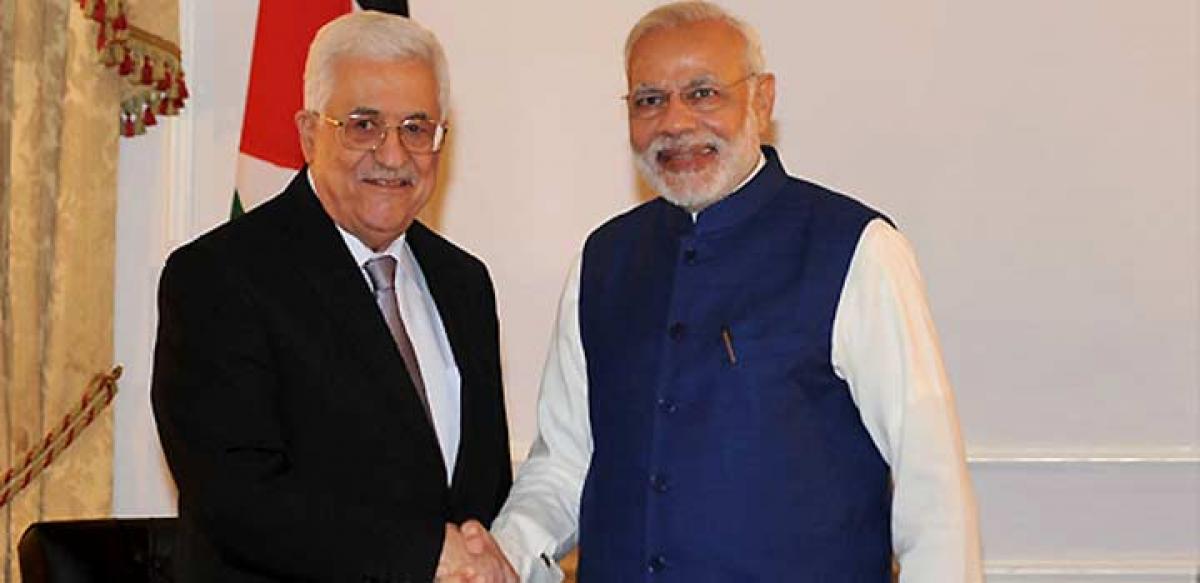Live
- Swarna Andhra@2047
- CM Revanth pitches for Railway Coach Factory at Kazipet
- ICU Ward opened at district hospital
- Pushpa Actor’S Action-Packed Day: Lights, camera, arrest
- National Lok Adalat today
- Teacher Manga Rani selected for national workshop
- MyVoice: Views of our readers 14th December 2024
- Soros & Gandhis links raise many disturbing questions
- Record additions in non-fossil fuel energy in India
- Indian teens’ grand arrival on world stage
Just In

No change in India’s Palestine policy. Prime Minister Narendra Modi met with Palestine President Mahmoud Abbas on the side lines of the 70th UN General Assembly session in New York on September 28, 2015.
Prime Minister Narendra Modi met with Palestine President Mahmoud Abbas on the side lines of the 70th UN General Assembly session in New York on September 28, 2015. Vikas Swarup, official spokesperson of the Ministry of External Affairs (MEA), tweeted that India was ‘bonding with Palestine’. Abbas last came to India in September 2012, for his fourth visit since 2005.

The previous high-level meeting at the side lines of the UNGA between the two sides was in September 2013 when Foreign Minister Salman Khurshid met with his Palestinian counterpart. Modi’s meeting with Abbas can be read as a further reaffirmation of the commitment of the government to maintain continuity in India’s Palestine policy.
The Modi government’s Palestine policy had come under scrutiny because of increased high-level interactions with Israel, to be capped by the upcoming visits of President Pranab Mukherjee and Prime Minister Modi to Israel, as well as its response to ‘Operation Protective Edge’, the Israeli military action from July-August 2014.
Israeli policy makers and analysts have often expressed displeasure at the lack of high-level political interactions with Indian leaders, despite the robust strategic engagement between the two countries. Modi’s meeting with Prime Minister Benjamin Netanyahu on September 28, 2014, on the sidelines of the 69th UNGA sessions, therefore garnered headlines.
This was the first interaction between the Indian and Israeli Prime Ministers since the September 2003 visit of Ariel Sharon to India. Press statements noted that discussions between Modi and Netanyahu pertained to defence ties, cyber security, water management, agriculture and solid waste management. Modi also accepted Netanyahu’s invitation to visit Israel.
The Modi government’s response to ‘Protective Edge’ came under criticism from the combined opposition, which demanded a resolution by Parliament ‘condemning’ the Israeli action. The government, however, rejected this demand after an unprecedented debate in the Rajya Sabha on July 21, 2014.
Foreign Minister Sushma Swaraj drew the attention of the Opposition to the BRICS Fortaleza Declaration of July 15, 2014 and the statement issued by the MEA on July 21. The BRICS Declaration, issued a week after Operation Protective Edge began, while reiterating the grouping’s staple positions on the Israel-Palestine issue, curiously did not even mention the then on-going escalation.
But the MEA statement had expressed ‘deep concern’ at the escalation of violence while at the same time registering India’s “alarm at the cross-border provocations resulting from rocket attacks at targets inside Israel”. Thereupon, the Opposition criticised the government for equating Israel’s military response with Palestinian rocket attacks, insisting that ‘massacre’ was only taking place on one side.
The Modi government has been reiterating the importance of relations with Israel while at the same time insisting that there has been no change in India’s Palestine policy. Recent reports suggest that the Israeli government is concerned at the delay in the finalisation of the dates for Modi’s visit and that a senior aide of Netanyahu visited New Delhi to expedite the process.
Modi’s meeting with Abbas in New York puts to rest doubts about any imminent changes in India’s policy of voting in favour of Palestinian-related resolutions at the UN. In 2014, India voted in favour of each of the 14 such resolutions moved in the UNGA. All these resolutions criticised Israeli settlement activity in the occupied territories and supported the work of the UN Relief and Works Agency (UNRWA) for Palestinian Refugees, among others.
Israel on its part views these resolutions as ‘outrageous’ and funding the ‘defamation and de-legitimisation’ of Israel. Therefore, it would seem that India and Israel will continue to ‘agree to disagree’ as regards India’s voting pattern in the UN on Palestine-related issues for the foreseeable future.
India, however, abstained at the UN Human Rights Commission (UNHRC) on July 1, 2015 on a resolution welcoming the report of the Commission of Inquiry established a year ago to investigate violation of international humanitarian and human rights law in the ‘Occupied Territories’ during ‘Protective Edge’.
The resolution, among other requirements, urged Israel and its antagonists to cooperate with the International Criminal Court in its ‘preliminary examination’ of the issue. India’s stance then was welcomed by some Israeli analysts who termed it as a ‘major change’ in its policy position.
In effect, India’s voting pattern at the UN on issues relating to Israel and Palestine did not register any perceptible change in 2014. This further substantiates the view that there has not been any change in India’s Palestine policy as a result of the change in government.
By S Samuel C Rajiv

© 2024 Hyderabad Media House Limited/The Hans India. All rights reserved. Powered by hocalwire.com







